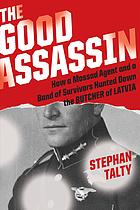
The Good Assassin
How a Mossad Agent and a Band of Survivors Hunted Down the Butcher of Latvia
کتاب های مرتبط
- اطلاعات
- نقد و بررسی
- دیدگاه کاربران
نقد و بررسی

January 20, 2020
Journalist Talty (Saving Bravo) revisits the 1965 assassination of Latvian war criminal Herbert Cukurs by Israeli secret agents in this brisk and dramatic history. Soon after German forces pushed the Soviet Army out of Latvia in 1941, Cukurs, a renowned aviator, became second-in-command of the Arajs
Commandos, volunteer paramilitaries who assisted the S.S. in carrying out mass killings. Eyewitnesses describe Cukurs murdering women and young children, and supervising the liquidation of the Riga Ghetto, which sent nearly 30,000 Jews to their deaths. In 1946, he fled to Brazil and started a successful boat rental and sightseeing business. Despite lobbying by Latvian Holocaust survivors and Brazilian Jews, local police refused to take action against Cukurs, and by 1965 the statute of limitations for prosecuting Nazi war criminals was set to expire in West Germany. In a plan approved by the Israeli prime minister, Mossad agent Jacob Medad, who’d helped to capture Adolf Eichmann, disguised himself as an Austrian businessman, befriended Cukurs, and brought him to Uruguay, where a team of assassins killed him. According to Talty, international publicity over the case helped push German legislators to extend the statute of limitations (it was formally abolished in 1979). Talty efficiently mines archival records for vivid details and tracks the complexities of Medad’s undercover mission with flair. The result is a captivating and gruesome real-life spy thriller.

February 1, 2020
In this thrilling account, Talty (A Captain's Duty) tells parallel stories of the Holocaust and its aftermath. Jewish college student Zelma Shepshelovich survived the massacre of Latvian Jews in 1941, and also Herberts Cukurs, a Latvian aviator, Nazi collaborator, and mass murderer who fled to Brazil after World War II. In Brazil, whose right-wing government sympathized with Nazi fugitives, Cukurs ran his own business until revenge caught up with him. Israeli secret agent Yaakov "Moi" Meidad posed as an Austrian investor, lured Cukurs to a safehouse in a neighboring country, and shot him dead after a struggle. The assassination of the "Butcher of Riga" reminded the world that many killers had escaped justice. That same year of 1965, under intense pressure by Western democracies as well as Nazi hunter Tuviah Friedman, the German parliament grudgingly voted to extend the statute of limitations on Holocaust-era crimes, enabling prosecutors to indict hundreds of Nazi war criminals. Bloodbaths, spy games, and personalities--fiery Zelma, reserved Meidad, scrappy Tuviah, paranoid Cukurs--are recounted vividly but not exploited for shock value. VERDICT A fast-paced, recommended work that enthralls, edifies, and reveals the disturbing extent to which Latvians and others participated in genocide.--Michael Rodriguez, Univ. of Connecticut, Storrs
Copyright 2020 Library Journal, LLC Used with permission.

February 15, 2020
The compelling story of the pursuit of a man responsible for the murders of at least 30,000 Latvian Jews during World War II. Talty, whose bestselling books include The Black Hand and A Captain's Duty (which was made into the Oscar-winning Tom Hanks vehicle Captain Phillips), remains true to his technique, delivering thoroughly researched, engrossing nonfiction in a thrillerlike narrative style. The author has several stories to tell, including that of Latvian murderer Herbert Cukurs, who transformed from a heroic civil aviator to a brutal executioner; the Holocaust in Latvia in general; Zelma Shepshelovich, a young Jewish woman who managed to escape capture and deportation; a Mossad agent called Mio, who endeared himself to Cukurs before leading him to his death in a house in Uruguay; the battle against granting amnesty to Nazis some years after the war; and Nazi hunters Tuviah Friedman and Simon Wiesenthal. Talty weaves these stories throughout the text, creating a rich narrative fabric, and the tension increases substantially when Mio finds Cukurs, who is suspicious and cautious, in Brazil and convinces the murderer that he is looking to get involved in business deals with him. The intense climax of the action (the death of Cukurs) occurs more than 40 pages before the end of the text; the final pages deal with the immediate and later after-stories of the principal characters. The author reveals both the profound darkness of the time period and the slender rays of hope that occasionally split it. The Holocaust accounts--degradations, torture, murder, etc.--are difficult to read yet nonetheless important. "Cukurs was hardly unique; there were many men like him in Poland, Ukraine, Romania, Hungary, and elsewhere," writes Talty. "But in his local context, he was the leading monster." As anti-Semitism surges once again, this page-turning history reminds us of the sanguinary consequences of unchecked hatred.
COPYRIGHT(2020) Kirkus Reviews, ALL RIGHTS RESERVED.

March 1, 2020
Herbert Cukurs was a pioneering aviator before WWII, somewhat famous and not markedly anti-Semitic, but he nevertheless carried out the Nazis' dirty work in his native Latvia. Talty (Saving Bravo, 2018) brings the efforts of Holocaust survivors to achieve justice two decades after the war's end into vivid focus with this dramatic history of a long-concealed operation. Israeli intelligence dispatched their best agent, Yaakov Meidad, and his team to Brazil in 1965, where Cukurs was living openly. Their mission was to mete out the extralegal justice that was about to become the only recourse left to Jewish victims with the impending amnesty for Nazis in West Germany. The author brings his usual attention to detail, excellent research, terrific storytelling, passion, and dedication to this suspenseful recounting of a shadowy facet of the Holocaust, which continues to haunt the world. Talty's revealing history explores difficult subjects of justice and vengeance, opportunistic rage unleashed by the chaos of war, Latvia's identity crisis as it was crushed between two totalitarian regimes, and the lengths to which war criminals will go to avoid responsibility for their actions.(Reprinted with permission of Booklist, copyright 2020, American Library Association.)

























دیدگاه کاربران